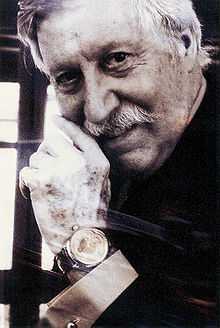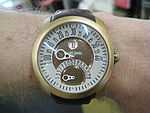Gérald Genta
| Gerald Genta | |
|---|---|
 | |
| Born |
Charles Gérald Genta May 1, 1931 Geneva, Switzerland |
| Died | 17 August 2011 (aged 80) |
| Occupation | watchmaker, businessman |
Charles Gérald Genta (1931-2011) was a Swiss wristwatch designer, noted for his eponymous line of time pieces as well as his design work with other firms, including IWC, Universal Genève, Patek Philippe and Audemars Piguet, among others. Christie's auction house of New York called Genta's work "the Fabergé of watches" by ,[1] and as the "world's most complicated and pricey watches" by The Wall Street Journal.[2]
Biography
Genta was born in Geneva to a Swiss mother and father of Piedmontese (Northern Italian) descent. At age 20, Genta finished jewelry and goldsmith training in his native Switzerland, earning a Swiss federal diploma.
Subsequently, Genta was recruited by Universal Genève SA, at the time one of the most recognized manufactures in both the U.S. and Europe for its chronograph models. After Universal Genève settled a patent dispute involving the micro-rotor caliber, Genta designed Universal's Polerouter Microtors in the 1950s, as well as the Golden and White Shadows during the mid-1960s. The Shadows contained a micro-rotor, unisonic and accutron movement, the latter two a result of the quartz crisis starting in the late 1960s.
Genta's work with Universal would be a precursor to future collaborations with other brands in Switzerland and throughout Europe, including Omega's Constellation (1959); Patek Philippe's Golden Ellipse (1968). Audemars Piguet's Royal Oak (1970), IWC's Ingenieur (1976); Patek Philippe's Nautilus (1976); and Cartier's Pasha de Cartier (1997)

After starting his own brand in 1969, Genta would create the sonneries, among them the Gérald Genta Octo Granda Sonnerie Tourbillion, which contained four gongs and an emulated Westminster Quarters bell ring at each quarter and on the hour, "the same melody rung out by London's Big Ben", and priced at $810,200.[3] In 1994, he designed the Grande Sonnerie Retro, the world's most complicated wristwatch, and priced at approximately $2 million.[4] For private requests, Genta hand-designed the movements, dials and cases of his timepieces and employed limited or no external assistance, outsourcing or mechanization during the process; it was not unusual for a single watch to take up to 5 years to complete.[5]
During the 1980s, Genta obtained special licensing with The Walt Disney Company and distributed a limited edition of Disney character watches to the public; previously, they had been an unofficial private request by one of Genta's repeat customers. The dials consisted of illustrations of Mickey Mouse, Minnie Mouse, Donald Duck, Scrooge and Goofy, with cases made of 18 carat gold. Designed in Le Brassus, Switzerland, the watches retailed between $3250–$3650 in 1988.[6]

Gerald Genta's clients have included professional athletes, business executives, rock musicians, rappers, movie stars, politicians as well as royalty, including Prince Rainier of Monaco, King Hassan II of Morocco, King Juan Carlos and Queen Sofia of Spain, King Fahd of Saudi Arabia and Queen Elizabeth The Queen Mother of England.[7]
After his eponymous company was acquired by Bulgari in 1999, Genta resigned and created a new venture called Gerald Charles. As of 2010, Gerald Genta watches were marketed solely under the Bulgari brand. As Bulgari had been acquired by upscale French conglomerate Louis Vuitton–Moët–Hennessy in 2011, all "Gerald Genta" brand watches would in effect be products of the LVMH portfolio.
Genta died in August 2011 at age 80.[8]
References
- ↑ Guest, Tim (2005). My Life in Orange: Growing Up with the Guru (page 258). Mariner Books. ISBN 0-15-603106-X.
- ↑ The Wall Street Journal (Index, Volume 1; page 429) (Dow Jones & Company). 1996.
- ↑ Jack Forster For whom the bell tolls; For thee if you wear a minute repeater, the most complicated watch there is page 101 December 2009 Forbes Life
- ↑ Aylmer, Editor in Chief, Sean (1998). Business Review Weekly (Volume 13, Issues 33-42). Fairfax Media.
- ↑ Chilton &, Co (1995). Jewelers' circular-keystone (CK., Volume 166, Issues 7-9).
- ↑ Texas Monthly (December 1988). Emmis Communications. 1988.
- ↑ "The Genta Touch". Retrieved 3 January 2013.
- ↑ "Tribute to Gérald Genta". Retrieved 28 August 2011.
External links
- New company website
- Gerald Genta's Omega Connection
- Gerald Genta Profil by Michael Weare